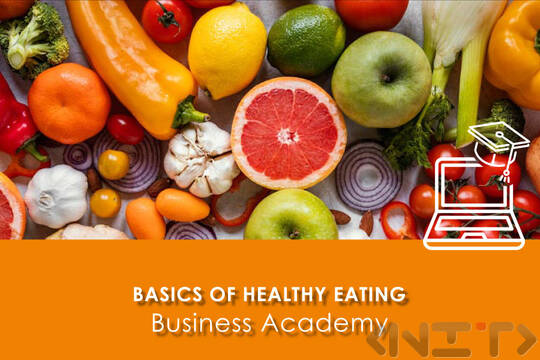The focus of our e-learning is on the basics of healthy eating, namely macro and micronutrients, the nature of calories, recommended caloric intake for men and women, anabolism and catabolism, ATF, energy balance, caloric deficit and much more valuable knowledge. The course also includes tips for building a healthy diet.
Nutrition is a fundamental life process directly related to the intake, absorption and processing of food needed to build and renew cells and tissues, to carry out and regulate the body's vital functions, and to compensate for its energy expenditure. Nutrients are those life-sustaining elements that the human body cannot synthesize on its own, either at all or not in sufficient quantity. In order to survive, it must obtain them through a balanced diet.
You will learn about the role of water in the body. Even though drinking water is one of the first skills we learn in life, it turns out that most of us have never learned how to make full use of its power. You probably know about the rule that 8 glasses of water a day is a must if you want to stick to a healthy lifestyle. But at what time and in what way should you take them? You will learn in the training.
Interestingly, depending on their colour, foods exhibit particular qualities. We can distinguish several of the main colours found in plants and their properties in our study.
Did you know that the only vitamins the human body can produce naturally are D and K? All others must be supplemented through food or supplements. Since there is no food that contains all types of vitamins, one must eat a varied diet. An example of a food source of vitamins are given in the training.
Contents
The structure of the training implies the gradual absorption and upgrading of knowledge, along with valuable tips that you can apply today.
I. What is the process of "feeding"?
II. Nature and types of nutrients. Macronutrients
Macronutrients
- Proteins, also called proteins
- Types of proteins
- Carbohydrates
- Types of carbohydrates
- Fats (triglycerides)
- Types of fat
- Fibres
- Types of fibre
- Beneficial effect of fibrе
- Water
- Role of water in the body
- The water cycle
- Tips for proper water intake
III. Nature and types of nutrients. Micronutrients
1. Phytochemicals (phytonutrients)
- Basic types of phytochemicals:
- Coloured foods
2. Antioxidants
3. Vitamins and minerals
- Vitamins
- Minerals
IV. Calories
1. Nature of calories
2. Calories in food
- Satiety index
- Empty calories
3. Required calorie intake
- Tips for building a healthy diet
V. Energy and metabolism (metabolism)
1. Nature, functions and measurement of energy
2. Anabolism and catabolism
- Anabolism (constructive metabolism)
- Catabolism (destructive metabolism)
3. Energy balance - nature and method of determination
- Calorie deficit
- Safe weight gain
- Calories during pregnancy
- Determination of energy balancе
- Basal metabolic rate or resting energy expenditure (BMR/REE)
- Thermal Effect of Food (TEF)
- Physical activity energy expenditure (AEE)
VI. Basic diets
1. Plant-based nutrition
2. Elimination diet
3. High carbohydrate diet (HCD)
4. Low carbohydrate diet (LCD)
5. . Ketosis, ketone/keto diet
- Classic ketogenic diet (KCD)
- Modified Atkins Diet (MAD)
- Low glycemic index treatment
6. Intermittent fasting
7. Balanced diet (BDA)
Exercise
- Online recipe for making a colorful green salad with olives and feta cheese. You will be able to choose your own products for different number of servings. And at the end of the exercise, you will also learn how to burn the calories you have accumulated.
Bonus materials in the training
- Which foods contain gluten?
- Weekly menu
- Sources of vitamins in food
- Calories in food
Short excerpt from the training
How is the training?
When a learner signs up for the course, they are given a personal account to access the training. It is taken online, at a time and place convenient to the user.
After successful completion of the training, the trainees receive a certificate.
If you are interested in our services or have further questions, you can contact us at +359 878 685 304 or e-mail: office@nitbg.com




